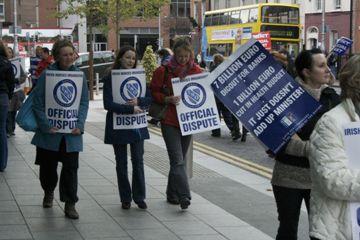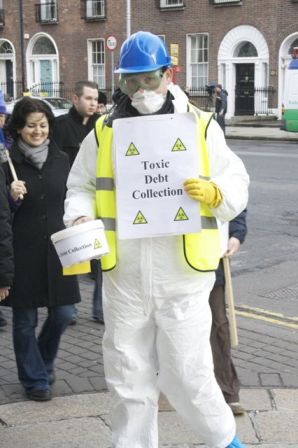Civil servants both support and condemn strike action

Over 250,000 public sector workers across the country went on strike today over plans to slash €1.3 billion from the public sector wage bill, bringing many essential services to a halt. General Secretary of IMPACT, Peter McLoone acknowledged yesterday that the strike will cause hardship to those who depend most on public services. However, he, like many on the picket lines, argues that the Government has forced workers into strike action by failing to negotiate a fair alternative to a public sector pay cut. Politico visited various picket lines across Dublin city centre today to gauge the level of support for the strikes and hear firsthand from public sector workers on the picket lines.
Politico spoke to a diverse range of people, from university lecturers to low-level clerical staff. Generally, the strikers were reserved and diplomatic about their situation. At least one union sent an email to its members advising them not to say anything “contentious” to the media. However, generally striking workers were eager to present their case to the media and, although there was differing levels of support for the strike itself, those on strike were united on number of fundamental points.
There is fierce resentment among public servants, in relation to both their treatment by Government and their treatment in the media. A civil servant, who did not want to be named, said that the public are failing to realise that public sector workers have already taken a seven per cent pay cut and despaired that she (and those like her) “might nearly be better to give up and be on social welfare” because they would be financially better off.
Myles Glynn who works in the Department of Agriculture told Politico; “What we’re looking for is fairness and equality, fairness and equality are a massive part of this. No one sector of society should be forced to pay for the rest, it’s all in or all out. The message we’re getting from the government is probably best served with a quote from George Orwell’s ‘Animal Farm’; all animals are equal but some animals are more equal than others”.
The general consensus among those on strike was that alternatives to the public sector wage cut could be found through taxation, specifically taxing higher income bands. A senior lecturer at Trinity College argued that he (and the members of his union) would be happy to see a system whereby high earners had their pay reduced through taxation, but said they could not accept any plan which solely target public sector workers.

However, there was also a universal despondency across all workers interviewed, and a general feeling that the strikes will not have a significant impact on budget day in two weeks time. A worker from the Department of Enterprise Trade and Employment told us that morale is at its lowest since he’s been in the department. He also stressed that the popular perception that public sector workers are very well paid is a fallacy and that they feel like the “whipping boys of the nation”.
Politico also encountered many workers who said that they had voted against strike action. They believe that a strike is futile, and acceptance of the government’s proposals inevitible. One clerical officer, who again did not wish to be identified, told Politico that she and the majority of her colleagues are angry at the prospect of a second day of strikes. The same officer said that she believed that many public servants were “afraid” to speak out against the strikes and that she felt the action was simply ‘playing into the government’s hands’, saving them the day’s wage bill and damaging the public image of public servants.
Almost all schools, local authorities and social welfare offices were closed during the one-day action. About 55,000 social welfare recipients, including those on jobseekers allowance and maternity benefit, have had their payments delayed by one day because of the strike. Thousands of hospital appointments, planned admissions and non-emergency procedures were cancelled. However, despite the widespread inconvenience and some negative coverage in the mainstream media, street level support for the workers appeared strong, particularly around city centre hospitals.
Sinn Féin TDs today refused to pass pickets outside Leinster House in solidarity with public sector workers. Asked if party members would be forfeiting their day's pay, Deputy Ó Caoláin confirmed that they would, and suggested the same question should be put to TDs, who attended the Dáil for a 'sham' five minutes. Ó Caoláin further accused other TDs who crossed the picket lines of being complicit in a “sham'” given that they pledged to tackle the Government on the pay issue.
Today’s strike action went ahead amid clear signals that unions are preparing to resume talks with the Government. Last Friday the government published a document outlining the future of the public service which was largely dismissed by unions who argued that it does not contain adequate guarantees on protecting public pay, pensions and services. However, union leaders have conceded that the document could provide a basis for negotiation with Government. It is thought that unions will tomorrow return to intense talks with Government on long-term plans for the restructuring of the public service, and short-term measures to cut the State pay bill.
This is despite the fact that this evening it was announced that there will be a second day of nationwide strikes on 3 December, if the dispute has not been resolved by then.
One individual who works in the Oireachtas told Politico today that the mood within the Oireachtas is particularly strained at the moment.
